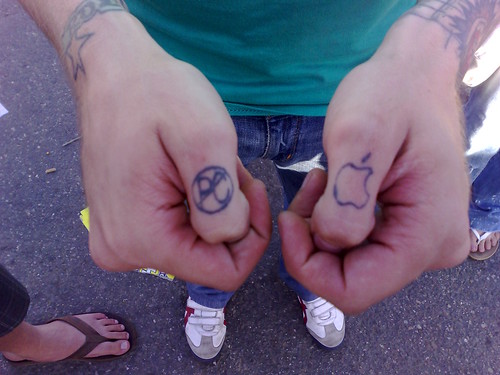
photo by: danny newman

are YOU thinking about how your brand can let people express their sense of identity?
you SHOULD be.
BONUS POINTS: to anyone who found themselves wondering: “what brand of kicks is that he’s wearing?”

photo by: danny newman

are YOU thinking about how your brand can let people express their sense of identity?
you SHOULD be.
BONUS POINTS: to anyone who found themselves wondering: “what brand of kicks is that he’s wearing?”
and it goes a little something like this:
following on the heels of the previous post musing about the acceleration of cultural evolution, i thought it might be a good idea offer some kind of more concrete context for the process of how culture gets created. this video has been circulating for a few years at this point, but for anyone not familiar with it, it’s a fascinating breakdown (badum-ching!) of the impact of the “amen break”–a 6-second long drum sample from 1969 that can, in a strictly technical sense be held accountable for the musical evolution of hip hop, along with the spawning of a number of other subcultures.
(it’s a bit long but the video never changes, so don’t feel compelled to watch the whole thing. feel free to just listen to the audio.)
enjoy!
1 2 3
That’s the speed of the seed
A B C
That’s the speed of the need
You can dream a little dream
Or you can live a little dream
I’d rather live it
Cuz dreamers always chase
But never get it
– Aesop Rock: “No Regrets”

there is some kind of undeniable human fascination with child prodigies. is it perhaps because it’s the most exact way we have of cutting out all the middling aspects of “training,” and being able to see skill condensed into its purest form–talent? that freaky supernatural phenomenon that at its most intense is on par with, like, massive natural disasters for the sheer humbling awe and dread it manages to elicit? an unbridled, unsolvable riddle of nature as brute and mysterious as an earthquake, and as morbidly compelling as its aftermath.
…it’s one guess, anyway.
one possible explanation for why we find superhuman precociousness quite so captivating. for reference, go to youtube and just type “connie” in the search field. just see what happens. there’s also a documentary coming out called My Kid Could Paint That about marla, a 4-year old abstract painter genius, and the resultant controversy that such a feat arouses in our adult sensibilities–unable as we are to conceive of the preternatural just as much as of the nature of the universe itself.
so, of course, the first thing i could think to say when i watched this video my friend siouxzen sent me of two little kids scratching records was:
“is this real?”
as it is, undoubtedly, the first thing you’ll wonder once you watch it as well.
the second thing you have to wonder at though, is that these kids, at 8 and 5 years old didn’t just achieve an astonishing level of proficiency over their singing voice, or the wielding of a paintbrush, or even the mastery of a piano. they just showed a pair of turntables what’s up in a way that’d make afrika bambaataa himself blush.
so what’s the difference?
the difference is that the very act of putting two turntables together side by side–originally to mix the end of one track into the beginning of another to create a seamless uninterrupted beat–was a critical component of the very origin of hiphop. hiphop, a genre of music and an subculture aesthetic that eventually went on to become a global cultural movement that has perhaps only ever been superceded in the breadth of its reach by jesus and the internet. hiphop, one of whose four defining elements is DJing.
a five year old just managed to master this element to a degree that most people who ARE old enough to read spend the rest of their lives chasing. and while, of course, these kids are no doubt astonishing anomalies, it does make you wonder about the degree to which the waves of cultural transmissions and innovations are speeding up in general.
in sociobiology there is a theory that the lifespan of the members of a particular species is determined in part by how mature they are at the time they are born. horses, for instance, who pop out ready to gallop more or less, are a lot more mature at birth than human babies, who are completely helpless. horses thus have shorter lifespans in comparison, and so it goes for the rest of animal kingdom. the reason for this is that the longer it takes an organism to mature, the longer it takes it to senesce (to get old, or, put another way: to die).
the piano’s been churning out prodigies since mozart, but 300 years later, how much more rapid is the turnover rate of culture now? how long can a movement be sustained before it’s run its course and been reinvented by the next species of mutant five year olds? in our accelerated global culture, do we end up shortening the lifespans of cultural movements themselves?
The Do LaB Artist Network – Issue #3: Fall 2007
NEW ISSUE UP NOW!
http://artistnetwork.thedolab

after months of work and an incredible team effort all around, the fall Artist Network is finally ready.
people without whose help this idea would not be a reality include: jesse shannon, arin ingraham, brian shaw, and albertico acosta. huge thank you to all of you for helping bring this vision to life.